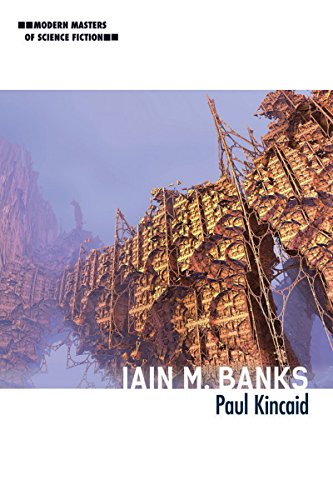 |
| Amazon link |
I bought this on the strength of Abigail Nussbaum's positive review. Russell Letson also has a review, which includes this:
"Kincaid outlines how the Culture was devised as a deliberate counter to earlier (particularly American) space-adventure conventions that Banks saw as militarist and imperialist and infected with “grandiose superhero thinking that has no place in the communal, socialistic approach that Banks takes in his fiction.”
He also argues for a break in that group of books – that the Culture sequence was essentially finished before the last three books (Matter, Surface Detail, and The Hydrogen Sonata, 2008-2012) were written – that the project was complete and that the later books represent a kind of retreading of old ground.
The job of the first set of Culture novels would seem to be to deconstruct not only the political notions behind traditional space opera, but also notions of utopia – to push at the contradictions in the Culture’s own view of itself. Excession, for example,
'is about presenting the Culture with barriers it is reluctant to cross…. We begin to get a picture of the Culture as a deeply conservative society, too attached to its comforts and plenty to be easy with the idea of risk or change…. we see that it is far less a utopia, far less perfect, than it likes to present itself.'Like the Culture itself, Banks’s thinking about attempts to square the circle of power, freedom, and ethical behavior in an imperfect world results in unresolved contradictions."
I've read all of Iain Banks's science-fiction (I abandoned Feersum Endjinn) but I do find the novels curiously unmemorable. Partially this is to do with their complex structure, the large cast of characters with indecipherable names, and detailed and baroque settings which can overwhelm the storyline. Sometimes it's hard to see the wood for the trees.
The first great service Paul Kincaid offers in this impressive piece of literary criticism is to confirm these complexities and to summarise the novels for the floundering reader. More than this, Kincaid dives deep into each book's thematic unconscious, distilling what he believes to be motivating the author.
He does a pretty good job. Kincaid sees Banks as eternally wrestling with his ideal society. If utopia is post-scarcity communism where oppression is definitionally absent, then how do people spend their time? If the Culture is about freedom, how does it deal with cultures which don't share the Culture's value system?
Perhaps in Banks's earliest formulations, these seemed distant and rather easy problems to solve. Yet the more he engaged, the more problematic the Culture became. In the end, utopia seems smug, boring, shallow, selfish, cowardly - even imperialistic.
Banks was a smart guy but he was also a proud bien-pensant liberal, a world-view which is curiously unreflective of the true roots of its value-system. In that spirit, Banks never quite resolved the contradictions at the heart of his own philosophy.
This is a mature, comprehensive and above all interesting take on all of Iain Banks's work and it's recommended.
---
Next: A Culture fit for dodos
No comments:
Post a Comment
Comments are moderated. Keep it polite and no gratuitous links to your business website - we're not a billboard here.